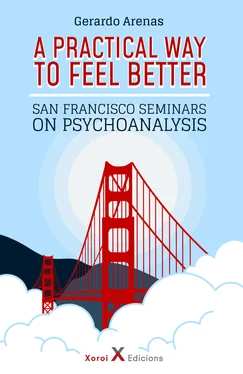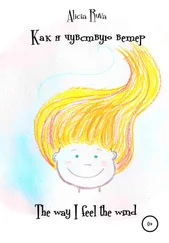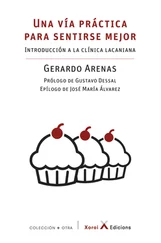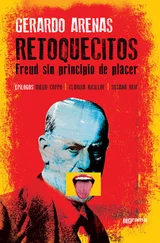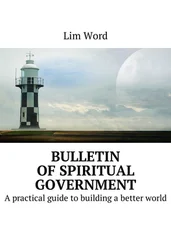A PRACTICAL WAY
TO FEEL BETTER
San Francisco Seminars on Psychoanalysis
Gerardo Arenas

Original title:
A Practical Way to Feel Better
San Francisco Seminars on Psychoanalysis
© Gerardo Arenas, 2020
© Pensódromo SL, 2020
Cover Design:
Cristina Martínez Balmaceda – Pensódromo
Publishing imprint: Xoroi Edicions.
Editor: Henry Odell
e-mail: p21@pensodromo.com
ISBN print: 978-84-121488-5-5
ISBN e-book: 978-84-121488-6-2
This book is sold subject to the condition that it shall not, by way of trade or otherwise, be lent, re-sold, hired out or otherwise circulated without the publisher’s prior consent in any form of binding or cover other than that in which it is published and without a similar condition including this condition being imposed on the subsequent purchaser.
Introduction and Acknowledgements
Psychoanalysis―Lacan said―is a practical way to feel better. This book can be considered an explanation of this sentence. It is based on two seminars held on March 6 and 7, 2020, at the California Institute of Integral Studies (San Francisco), thanks to the kind invitation of the Lacan School of Psychoanalysis (LSP). The first two chapters are related to the first seminar, entitled The Structure of Interpretations , and the other two correspond to the second one, entitled The Economy of Jouissances .
The impulse to transform both seminars into a book came from the audience, so I owe my first acknowledgement to those people, especially An Bulkens, Hannah Bennett, Marcelo Estrada and Maria Liza Ahearne, whose questions and comments made me feel that what I had transmitted was valuable to them. The publication aims to collaborate in the double task of installing the analytical discourse in the United States and building a bridge between the LSP and the Schools reunited in the World Association of Psychoanalysis (WAP).
I would also like to express my gratitude to Nathan Lane for his great help in preparing the seminars, Maria Liza Ahearne for the revision of the manuscript, Rodrigo Arenas for polishing the final version, and Henry Odell for his delicate editing work. In order to make the reader feel as if they have witnessed the aforementioned seminars, I have decided to maintain their colloquial style and gather the bibliographic references at the end of the book.
Buenos Aires, April 2020
Symptoms of Speaking Bodies
It is a pleasure for me to be here and have the opportunity to enjoy a few hours of shared work with you. It is a good way to start getting to know each other. I propose to divide these three hours into two parts, pausing halfway to open the dialogue and rest a little, and then leave another period at the end of the tour to deepen the exchange. I also ask for leniency in my way of speaking English, which I have used very little since I quit my job as a nuclear physicist, almost thirty years ago, to devote myself full-time to psychoanalysis, which is my passion. At that time, I dreamt of coming to the United States because it was on the forefront of scientific research. Today, however, I come to talk about psychoanalysis, which is not a science, in a country where it is difficult to practice psychoanalysis and it is even more difficult to make a living from it.
How did I get here? Let me tell you a brief tragicomedy, but not as a detour, but as a way of getting into the subject, like the “metalogs” created by the famous and admired resident of San Francisco, Gregory Bateson1. The tragicomedy is the story of three unforgettable cupcakes.
Once upon a time, during a busy meeting at the Escuela de la Orientación Lacaniana (EOL) in Buenos Aires, where hundreds of people gathered for a seminar, a friend introduced me to Maria Liza Ahearne who, in the middle of the crowd, told me something about an interview . Unable to pay her much attention, I gave her my phone number and said goodbye. Then we coordinated a time to meet in my office.
Those who know her will agree that politeness and kindness stand out among the virtues that characterize her. One morning, at the appointed time, she arrived at my office and, upon entering, handed a delicate package containing three cupcakes. Surprised by this, I left the package on the desk, invited her to come in, and said, “I’m listening.” I guess she was also surprised, but she didn’t show it. With the greatest delicacy, she asked me if she would be allowed to record the interview. Even more bewildered, I firmly said no . And she, determined to overcome all the obstacles in the politest manner, took a notebook and a pen and prepared to write. I was totally baffled. I misunderstood everything: she didn’t expect to do an interview to begin an analysis, rather she thought that I agreed to be interviewed as part of her ethnographic research. And I noticed it only when she took out some papers and addressed me with a long list of questions.
It must not have been more than two minutes between when she arrived and when I discovered my enormous misinterpretation based on the polysemy of the term interview , but those two minutes suddenly became eternal and the desk, upon which I had left the delicious cupcakes so kindly brought by Maria Liza, felt light years away. I myself had metamorphosed into a rude and ungrateful man, unable to offer even a cup of coffee to the gentle interviewer. I felt so embarrassed, so ashamed, that I did not know how to reverse the situation and, since I had inevitably looked like a weirdo and a lout in her eyes, I decided to undo my initial discourtesy by redoubling my generosity during the time of the answers. I urgently needed to compensate for my involuntary rudeness, and I think I may have succeeded, at least to some extent, since I suppose that I have not been invited to San Francisco as a zoo specimen so that you can witness how impolite and unfriendly Argentine psychoanalysts can be (something that must not necessarily be ruled out), but because the conversation that followed the initial setback must not have been too uninteresting.
Be that as it may, when Maria Liza left, her three cupcakes looked at me with an expression of reproach probably similar to that of the sardine can that looked at Lacan…
I offer here, publicly, my apologies. But this introduction does not have this sole purpose. It so happens that, for better or worse, this and other kinds of interpretations weave all our social ties, including the analytic tie, and that is why misunderstanding is an essential, not contingent, part of human relationships. In fact, it is one of their most creative parts. Those who think that language is a mere sophistication, added to a system basically created for naming things, are wrong. In truth, words are not even meant to refer to things, as Michel Foucault explained.
To the despair and disgust of those who engage in logical empiricism or in formal ontology―two disciplines so important for Anglo-Saxon analytical philosophy―the reference of language is essentially empty, as demonstrated three decades ago by Jacques-Alain Miller during one of his visits to the United States, at a conference entitled: “Language: Much Ado About What?” Argentine writer Jorge Luis Borges illustrated this essential emptiness by showing that the seemingly descriptive phrase “A cold wind blows from […] the river” is far from referring to any reality, contrary to what a famous Uruguayan writer (Horacio Quiroga) had suggested before him. How could Borges affirm that of such an objective phrase? Let’s say it like this: we feel that the air moves, and we give this the name wind , after which we compare its temperature with the memory of the temperature of other things we considered cold. But let’s recognize that the wind does not exist as such, and that it isn’t cold, and of course it cannot blow , either from the river or wherever it is, and finally notice that from the river indicates such an ambiguous and ill-defined direction that it could be from anywhere. In short, A cold wind blows from the river has as much ado about reality or whatever reference as any phrase in Joyce’s Finnegans Wake could have.
Читать дальше
